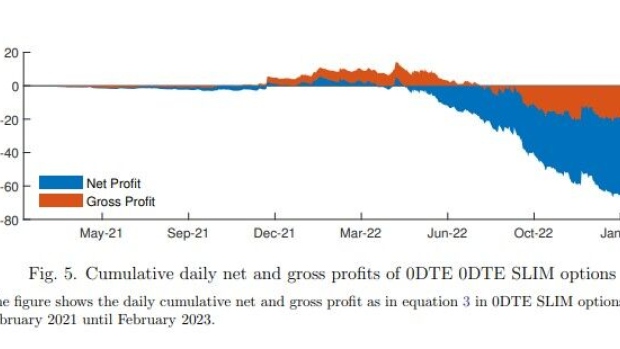Apr 21, 2023
Day Traders Lose $358,000 Per Day Gambling on Zero-Day Options
, Bloomberg News

(Bloomberg) -- Day traders are paying a price for their newfound love affair with one of the hottest trades in the equity market.
Rushing to join the trading frenzy in options with ultra-short lifespans, known as 0DTE for zero-days to expiration, small-time investors find themselves struggling to make it work. A fresh study from researchers at the University of Muenster in Germany shows the crowd may have lost $358,000 a day since May 2022, when it became possible to trade expiring contracts every day.
The record is alarming, but probably not a huge surprise. By one estimate, amateur investors took a billion-dollar bath dabbling in stock options during the pandemic boom. The new game of 0DTE is more challenging in many ways, among them the tight timeframe in which wagers need to work out.
The paper, titled Retail Traders Love 0DTE Options... But Should They?, is a reminder to investors and regulators alike that the latest investment innovations may not always be suitable for everyone.
“We are seeing the study as a cautionary tale,” Heiner Beckmeyer, who co-authored the study along with Nicole Branger and Leander Gayda, said in an interview. “These 0DTE options have huge leverage. They’re a one-or-zero bet, so you have the opportunity to make a lot of money, but you also have the opportunity to lose a lot. And that’s what we find in the paper that on average, it seems to be to the detriment of these retail investors.”
Zero-day options first garnered mainstream attention when retail investors embraced them as a cheap way of gambling during the meme-stock era in 2021. While the current craze involves indexes like the S&P 500 and has been driven by professional traders, 0DTE’s high-risk, high-reward potential — and potentially quick payoff — appeals profoundly to amateurs too.
By the researchers’ estimate, the retail crowd’s market share in 0DTE trading volume has expanded, topping 6% in 2022 versus 4% in the prior year. Among all of the cohort’s trades in S&P 500 options, such flashy contracts make up more than 75% of the total.
For all the engagement, however, the wagers largely failed to pay off.
While they did fairly well writing options, decisions to buy them suffered badly. All told, day traders lost $20 million as a result of poor positioning in about two years through February 2023. The bill climbed to more than $70 million when the cost of doing business with market makers was factored in.
To be sure, it’s not easy to make money in a new instrument that even Wall Street pros don’t seem to fully understand. To have an edge, one has to be extremely vigilant and nimble — and probably lucky.
A JPMorgan Chase & Co. analysis showed that while buying or selling 0DTE options tended to be profitable in the first 10 minutes of trading, two-thirds of the gains came in the first minute.
In the study by the University of Muenster researchers, they tracked all 0DTE transactions that were identified as being initiated by retail, netted them out as orders came in, and tallied a return at the end of each day.
They found the day-trader army has lost money on a net basis every month since Cboe Global Markets Inc. added Tuesday and Thursday expiration options for the S&P 500, expanding existing products to cover each weekday.
“Their hunger for lottery-like assets leads to large aggregate losses,” the researchers wrote in the paper. “Should daily expirations be rolled out for single equity options, the potential losses retail investors face are amplified manifold.”
Cboe didn’t respond to a request for comment.
--With assistance from Justina Lee.
©2023 Bloomberg L.P.





